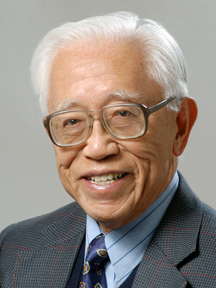Ernest S. Kuh
- Birthdate
- 1928/10/02
- Birthplace
- Beijing, China
- Death date
- 2015/06/27
- Associated organizations
- University of California, Berkeley
- Fields of study
- Circuits, Education
- Awards
- IEEE James H. Mulligan, Jr. Education Medal
Biography
Ernest S. Kuh was born in Beijing, China, on October 2, 1928, and attended Shanghai Jiao-tong University from 1945-1947. He received the B.S. degree from the University of Michigan in 1949, the S.M. degree from the Massachusetts Institute of Technology in 1950, and the Ph.D. degree from Stanford University in 1952. From 1952 to 1956, he was a member of the Technical Staff at the Bell Telephone Laboratories, Murray Hill, NJ. He joined the Electrical Engineering Department faculty at the University of California, Berkeley, in 1956, and from 1968 to 1972 he served as Chairman of the Department of Electrical Engineering and Computer Sciences. From 1973 to 1980 he served as Dean of the College of Engineering, University of California, Berkeley.
At the Bell Laboratories he worked on the L3 Coaxial System, the design of precision delay line and the analysis of the submarine cable repeater system. Since he joined the Berkeley faculty, he has made numerous fundamental contributions in electric networks and system theory, including synthesis of passive and active circuits, optimum design of parametric amplifiers and converters, state-space techniques in networks and feedback systems, and nonlinear and time-varying networks. His more recent interest lies in large-scale systems and circuit layout.
Dr. Kuh was co-author of three books: Principles of Circuit Synthesis, 1959 with Donald O. Pederson; Theory of Linear Active Networks, 1967 with Ronald A. Rohrer; and Basic Circuit Theory, 1969 with Charles A. DeSoer.
After important early contributions to circuit theory and analysis, Dr. Kuh switched his focus in the 1980s to what would become EDA, making long-lasting contributions in all aspects of design automation, with many methods adopted by the industry. He also developed simulators to handle large circuits with good accuracy and improved speed over existing programs. He has mentored about 40 Ph.D. students, who have made significant contributions in propelling EDA into the vital role that it plays in the electronics industry today.
Dr. Kuh is a member of the National Academy of Engineering and a member of the Academia Sinica. Among the various honors and awards he has received are the NSF Senior Post-Doctoral Fellow (1962), IEEE Fellow (1965), Miller Research Professorship, Berkeley (1965), National Electronics Conference Award (1966), Distinguished Alumni Award, University of Michigan (1970), the IEEE Guillemin-Cauer Award (1974), Achievement Award of the Chinese Institute of Engineers (1975), the Alexander von Humboldt Award (1977), Honorary Professor of Shanghai Jiao-tong University (1979), and IEEE James H. Mulligan, Jr. Education Medal, 1981.
Dr. Kuh was President of the IEEE Circuits and Systems Society in 1972, and was a member of the Board of Directors of IEEE in 1976-1977. He served on the Visiting Committee of the General Motors Institute, the Review Committee to the College of Engineering, University of Michigan, and the Scientific Advisory Committee of Mills College, Oakland, California. He served on several National Research Council-National Academy of Sciences Committees, including membership of the Steering Committee of the Evaluation Panels of the National Bureau of Standards, the Committee on an Assessment of Quality-Related Characteristics of Research-Doctoral Programs in the United States, and the Committee on Scholarly Communication with the People's Republic of China. He is also on the National Science Foundation Advisory Committee on Engineering and Applied Science.
In his spare time he played tennis and swims to keep in shape.
Dr. Kuh and his wife, Bettine, enjoyed travel. Although they loved their beautiful home in Kensington north of Berkeley, they have been on sabbatical leaves in England, Denmark, Japan and Germany. One of their most memorable trips was their visit to their homeland, the People's Republic of China, in 1973, some twenty-five years after Dr. Kuh left China.
They had two children. Anthony, with interests similar to his father, was an electrical engineer at the Bell Telephone Laboratories, Holmdel, New Jersey. He obtained his B.S. degree from Berkeley and M. S. degree from Stanford. Theodore majored in Business Administration, at Berkeley.
Dr. Kuh was the William S. Floyd Jr. Professor Emeritus in Engineering at the University of California, Berkeley. He died on 27 June 2015.
